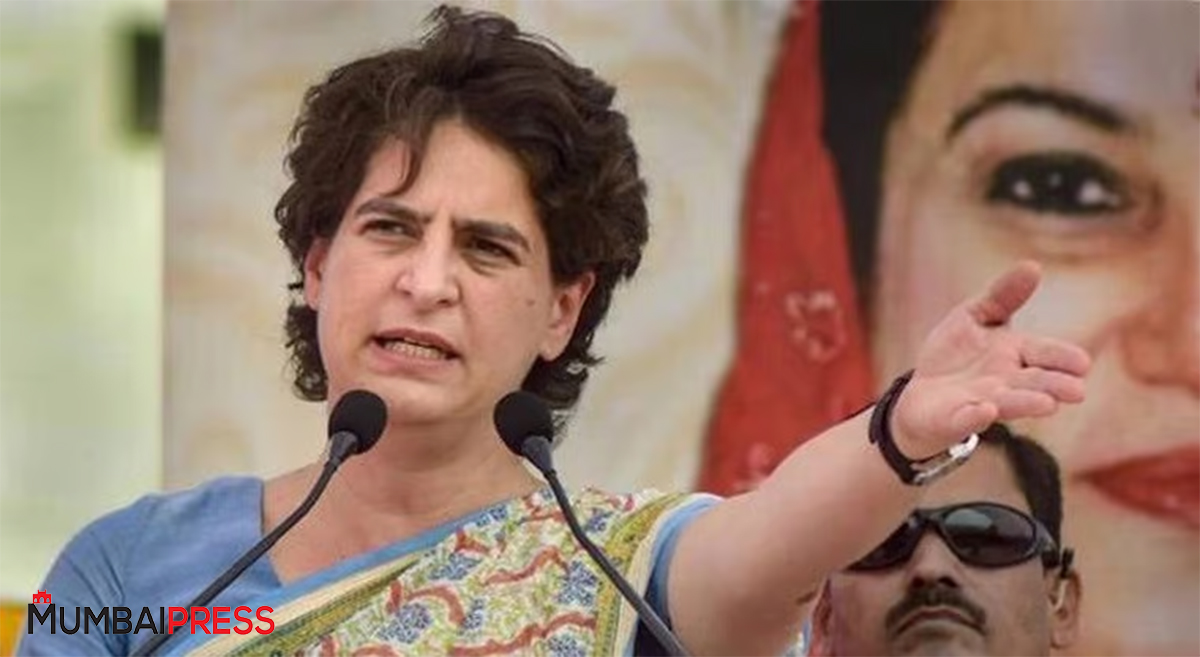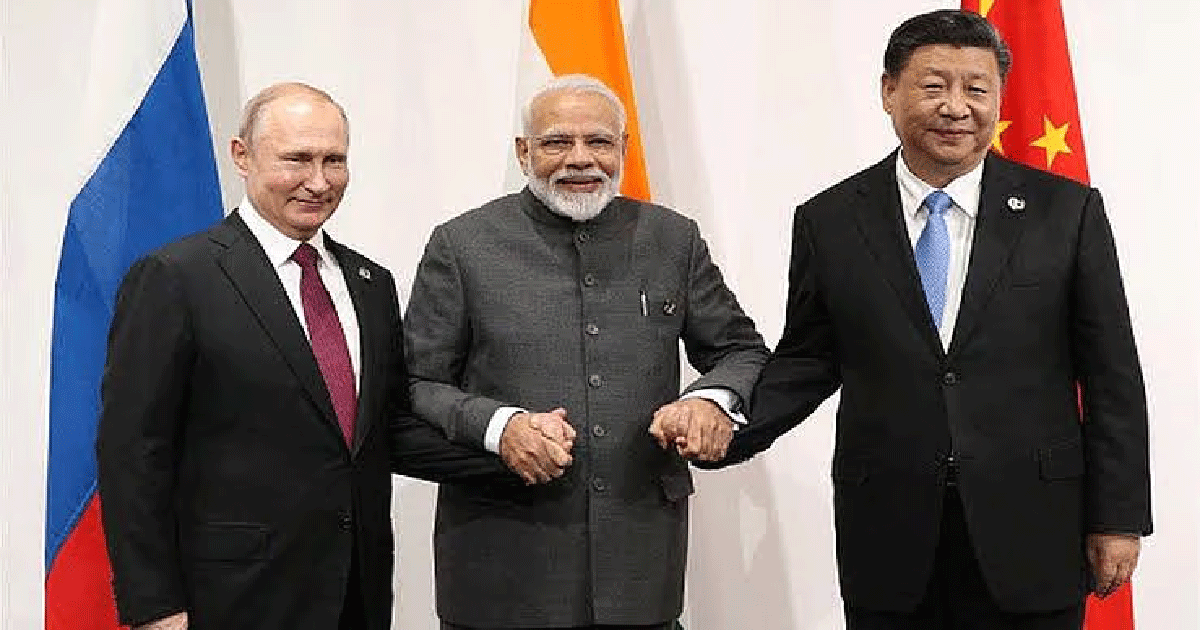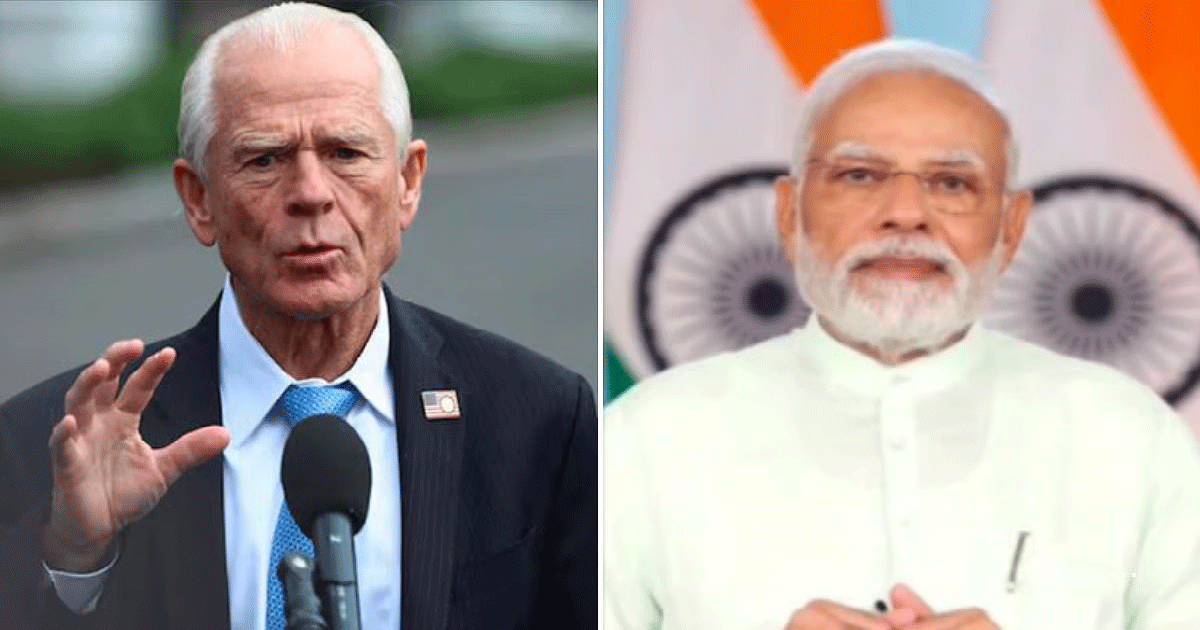International News
Israel Attack: Congress Leader Priyanka Gandhi Expresses Shock After India Abstains From Voting At UN For Ceasefire In Gaza

New Delhi, October 28: Congress General Secretary Priyanka Gandhi Vadra on Saturday expressed shock over India abstaining from the voting for a ceasefire in Gaza, and slammed the Central government saying that refusing to take a stand and watching in silence as every law of humanity is pulverised in Palestine is being annihilated goes against everything our country has stood for.
She also said that our country is founded on the principles of non-violence and truth and they represent the moral courage of India that guided its actions as a member of the international community.
‘An eye for an eye makes the whole world blind’
In a post on X, formerly Twitter, Priyanka Gandhi said: “’An eye for an eye makes the whole world blind’, Mahatma Gandhi. I am shocked and ashamed that our country has abstained from voting for a ceasefire in Gaza.”
‘Our country was founded on the principles of non-violence and truth’
Reminding of the principles of India, she said that our country was founded on the principles of non-violence and truth, principles for which our freedom fighters laid down their lives, these principles form the basis of the Constitution that defines our nationhood. “They represent the moral courage of India that guided its actions as a member of the international community,” the Congress leader said.
“To refuse to take a stand and watch in silence as every law of humanity is pulverised, food, water, medical supplies, communication and power is cut off to millions of people and thousands of men, women and children in Palestine are being annihilated goes against everything our country has stood for throughout its life as a nation,” Priyanka Gandhi added.
Her remarks came after India abstained in the UNGA from voting
Her remarks came after India on Friday abstained in the UN General Assembly from voting on a draft resolution submitted by Jordan, that called for an immediate humanitarian truce in the Israel-Hamas conflict, as it did not make any mention of the terrorist group Hamas.
In a first, India has voted against a UN General Assembly resolution backing the Palestine cause. India’s opposition to the resolution on Friday was because it failed to condemn Hamas for its terrorist attack and the Assembly rejected an amendment supported by New Delhi that would have named the terror group. India’s Deputy Permanent Representative Yojna Patel said after the vote: “The terror attacks in Israel on October 7 were shocking and deserve condemnation.”
‘Our thoughts are also with those taken hostages’
“Violence as a means to achieve political objectives damages indiscriminately, and does not pave the way for any durable solutions. The terror attacks in Israel on October 7 were shocking and deserve condemnation. Our thoughts are also with those taken hostages. We call for their immediate and unconditional release. Terrorism is a malignancy and knows no borders, nationality, or race. The world should not buy into any justification of terror acts. Let us keep aside differences, unite and adopt a zero-tolerance approach to terrorism,” she added.
Even Indian Overseas Congress Secretary Virendra Vashisth on Friday met Palestine Ambassador to India in solidarity. “Our foundation with Palestine from first Prime Minister Pandit Jawaharlal Nehru era to all successive prime ministers and it was the reason why the government had to change its statement earlier. And non violence and peace is the only way to find a solution and we also follow the policy of zero tolerance omn terrorism,” he said.
Fighting in the Gaza Strip has entered day 22
Fighting in the Gaza Strip has entered day 22 after Hamas members launched a surprise attack on Israel, killing at least 1,400 people on October 7. Since the October 7 Hamas attack, Gaza’s health ministry has said that Israel’s retaliatory bombardments have killed more than 7,000 Palestinians.
Business
India, Japan can diversify trade basket, open new frontiers with renewed efforts: PM Modi

Tokyo, Aug 29: Hailing the robust India-Japan economic and trade partnership, Prime Minister Narendra Modi on Friday said with renewed efforts, both nations can diversify their trade basket, make it more balanced, and open up new frontiers as well.
In an interview with Japanese newspaper The Yomiuri Shimbun, the Prime Minister said we must aim bigger and remain ambitious.
“The synergies across governments, businesses and people can create scale and speed in our economic partnership. As the world’s leading economies, we have been contributing to each other’s growth, competitiveness and dynamism,” PM Modi told the publication.
Japan has been a trusted partner in India’s infrastructure development across generations. The country has also been a leading source of foreign direct investment (FDI) for India in key sectors, including automobiles, electronics, telecom, chemicals, finance, and pharmaceuticals.
According to PM Modi, the number of Japanese firms in India has grown steadily to around 1,500, while more than 400 Indian companies operate in Japan.
“Clearly, this is only the beginning — the real potential is much higher,” he noted.
“We maintain important trade relations, but it has not yet reached the levels envisaged under our CEPA (Comprehensive Economic Partnership Agreement)… The 20th century saw Japan emerge as a major partner in India’s infrastructure development. I am confident that the 21st century will see Japan as a major partner in India’s innovation, manufacturing, and global value chains,” the Prime Minister emphasised.
On semiconductors, PM Modi told the publication that India’s semiconductor sector is on the cusp of transformation.
“We have put in place a comprehensive regulatory and policy framework, backed by incentives, to build a strong semiconductor and display ecosystem. Already, six semiconductor units are taking root in India, with four more on the way. By the end of this very year, ‘Made in India’ chips will be in the market, a clear demonstration of India’s design and manufacturing capabilities,” the Prime Minister said.
Japanese companies, with their technological strengths and global leadership, can play a pivotal role in this journey, he said, adding that a strong beginning has already been made.
“By combining India’s scale and capabilities with Japan’s advanced technologies, we can build a resilient and trusted semiconductor value chain,” PM Modi stressed, adding that this collaboration will support the technological ambitions of both our countries and enhance global supply chain security.
“I see semiconductor cooperation emerging as a major pillar of the India–Japan partnership. After all, in this digital century, chips are not just about computers, they are about competitiveness, credibility and confidence in the future,” he mentioned.
Some Japanese companies are positioning their production bases in India as hubs for third-country markets such as Africa.
According to PM Modi, India has seen multi-faceted reforms which make manufacturing in India easier than ever before.
“We have removed compliance burdens, rolled out incentives and ensured a large skilled workforce for companies to set base in India. Many global companies, including those from Japan, are setting up their production in India not only to cater to our domestic market, but also for the world,” he highlighted in his response.
Japanese automaker Suzuki Motor Corporation this week announced it will invest Rs 70,000 crore in India over the next five to six years. The investment will be used to increase production, introduce new car models, and protect its leadership position in the world’s third-largest automobile market.
“Just a couple of days back, I was at the Suzuki plant in India where we flagged off electric vehicles to be exported to a hundred countries, including Japan,” said PM Modi.
International News
PM Modi’s China Visit: Bilateral Talks With Xi Jinping & Vladimir Putin Confirmed At SCO Summit Amid Trump’s Tarrif Row

New Delhi: Prime Minister Narendra Modi will hold bilateral meetings with Chinese President Xi Jinping on August 31 and Russian President Vladimir Putin on September 1 in Tianjin, during the Shanghai Cooperation Organisation (SCO) summit.
The talks come at a sensitive moment, as India grapples with strained economic ties with the United States following tariff hikes by President Donald Trump.
India’s relationship with China, though still fragile, has shown signs of cautious improvement after years of confrontation. Tensions had escalated after the deadly Galwan Valley clashes in June 2020, but sustained diplomatic and military engagements have since led to withdrawals from some key friction points along the Line of Actual Control.
Despite heavy deployments, both sides have worked to lower the risk of fresh escalation. This will mark Modi’s first visit to China in more than seven years, his last being the informal Wuhan summit with Xi in 2018. The upcoming meeting is expected to test whether the managed thaw between the two Asian neighbours can move into a more stable phase.
The meeting with Putin is equally significant. With Moscow under Western sanctions over the Ukraine war, Russia is seeking to reinforce its traditional partnership with India while expanding its alignment with China. Officials have hinted at possible trilateral discussions involving India, Russia and China, which may surface in the Modi-Putin talks.
The wider SCO summit will draw leaders from across Central Asia, South Asia, the Middle East and Southeast Asia. For China, it represents a stage to assert leadership of the Global South and to extend diplomatic support to Russia. For India, the gathering provides an opportunity to reaffirm its place in multilateral forums and present itself as a balancing force in shifting global alignments.
International News
‘Modi’s War’: White House Trade Advisor Peter Navarro Blames India’s Oil Purchase For Ukraine-Russia Conflict

Washington, DC: White House Trade Advisor Peter Navarro has referred to the Russia-Ukraine conflict as “PM Modi’s war,” criticising India for purchasing discounted crude oil from Moscow.
In an interview with Bloomberg, Navarro blamed India for being the reason behind the US and Europe funding Ukraine against Russia’s aggression.
“Ukraine comes to us and Europe and says give us more money (for its war). Everybody in America loses because of what India is doing. Consumers and businesses lose, workers lose because India’s high tariffs cause jobs, income and higher wages. The taxpayer lose because we got to fund Modi’s war.” Navarro told Bloomberg.
He added, “The road to peace runs atleast partly through New Delhi.”
The White House trade advisor further termed India “arrogant” over prioritising its energy needs and advised it to “side with democracies.”
“The Indians are so arrogant about this. They say we don’t have higher tariffs. It’s our sovereignty. We can buy oil from anyone we want. India, you’re the biggest democracy in the world. Okay? Act like one. Side with the democracies,” Navarro said.
Navarro further attacked India for smoothening its ties with China, expressing his frustration over India’s growing relations with Moscow and Beijing, whom he labelled as “authoritarians.”
“You’re getting in bed with the authoritarians. China, you’ve been at quiet war with them for decades. They invaded Aksai Chin and all your territory. These are not your friends, folks. Okay? And the Russians, I mean, come on,” Navarro told Bloomberg.
Navarro’s remarks come after the 50 per cent tariffs on Indian goods imposed by the Donald Trump administration came into force on Wednesday. Of the 50 per cent tariffs, 25 per cent are imposed because of India’s continued purchases of Russian oil and military equipment, which the Ministry of External Affairs has described as “extremely unfortunate” and reiterated its stand to protect its national interest.
“In an official statement, the MEA said, “The United States has in recent days targeted India’s oil imports from Russia. We have already made clear our position on these issues, including the fact that our imports are based on market factors and done with the overall objective of ensuring the energy security of 1.4 billion people of India.”
“It is therefore extremely unfortunate that the US should choose to impose additional tariffs on India for actions that several other countries are also taking in their own national interest,” the statement added.
External Affairs Minister S Jaishankar has also responded to criticism of India by American officials for its energy ties with Russia, and said the US itself had asked New Delhi to help stabilise global energy markets by buying Russian oil.
Jaishankar called out the US logic to impose tariffs on India, despite China being the biggest purchaser of Russian oil and the EU being the biggest purchaser of LNG.
“We are not the biggest purchasers of Russian oil; that is China. We are not the biggest purchasers of LNG, that is the European Union. We are not the country which has the biggest trade surge with Russia after 2022; I think there are some countries to the South. We are a country where the Americans have said for the last few years that we should do everything to stabilise the world energy market, including buying oil from Russia. Incidentally, we also buy oil from the US, and that amount has increased. So honestly, we are very perplexed at the logic of the argument that you (the media) had referred to…” Jaishankar had said in response to a query during a joint press briefing with Russian foreign minister Sergey Lavrov in Moscow.
Not just Indians but US politicians and economists have also responded to US efforts to strong-arm New Delhi.
Earlier, renowned economist Jeffrey Sachs had strongly criticised the US administration’s decision to impose steep tariffs on India, calling them “bizarre” and “very self-destructive of US foreign policy interests”.
In a recent interview with ANI, Sachs expressed concerns that these tariffs will undermine years of efforts to strengthen US-India relations. Sachs described the tariffs as “not a strategy, but sabotage” and the “stupidest tactical move in US foreign policy”, which has unified the BRICS countries like never before.
Nikki Haley, former US Ambassador to the United Nations, has emphasised the importance of treating India as a “prized free and democratic partner” in the global effort to counter China’s growing influence. In her opinion piece on Newsweek, she warned that damaging the 25-year momentum in US-India relations would be a “strategic disaster.”
She urged Donald Trump to “reverse the downward spiral” and hold direct talks with PM Modi. “The sooner the better,” she said.
-

 Crime3 years ago
Crime3 years agoClass 10 student jumps to death in Jaipur
-

 Maharashtra11 months ago
Maharashtra11 months agoMumbai Local Train Update: Central Railway’s New Timetable Comes Into Effect; Check Full List Of Revised Timings & Stations
-

 Maharashtra11 months ago
Maharashtra11 months agoMumbai To Go Toll-Free Tonight! Maharashtra Govt Announces Complete Toll Waiver For Light Motor Vehicles At All 5 Entry Points Of City
-

 Maharashtra12 months ago
Maharashtra12 months agoFalse photo of Imtiaz Jaleel’s rally, exposing the fooling conspiracy
-

 National News11 months ago
National News11 months agoMinistry of Railways rolls out Special Drive 4.0 with focus on digitisation, cleanliness, inclusiveness and grievance redressal
-

 Crime11 months ago
Crime11 months agoBaba Siddique Murder: Mumbai Police Unable To Get Lawrence Bishnoi Custody Due To Home Ministry Order, Says Report
-

 Maharashtra10 months ago
Maharashtra10 months agoMaharashtra Elections 2024: Mumbai Metro & BEST Services Extended Till Midnight On Voting Day
-

 National News12 months ago
National News12 months agoJ&K: 4 Jawans Killed, 28 Injured After Bus Carrying BSF Personnel For Poll Duty Falls Into Gorge In Budgam; Terrifying Visuals Surface












